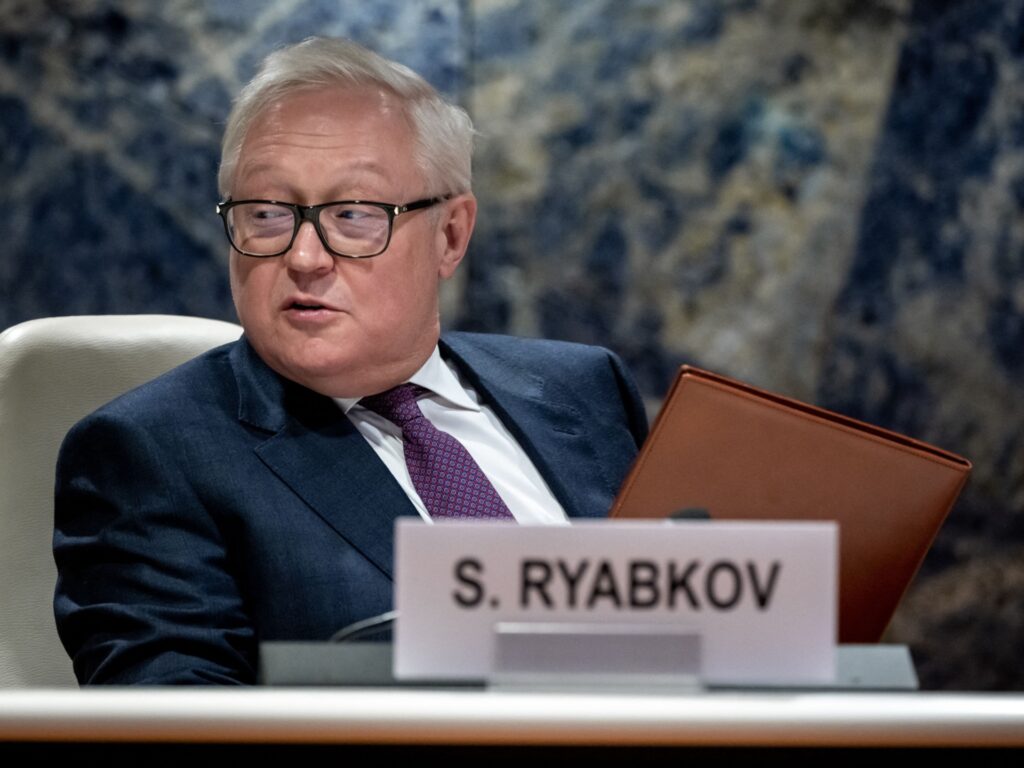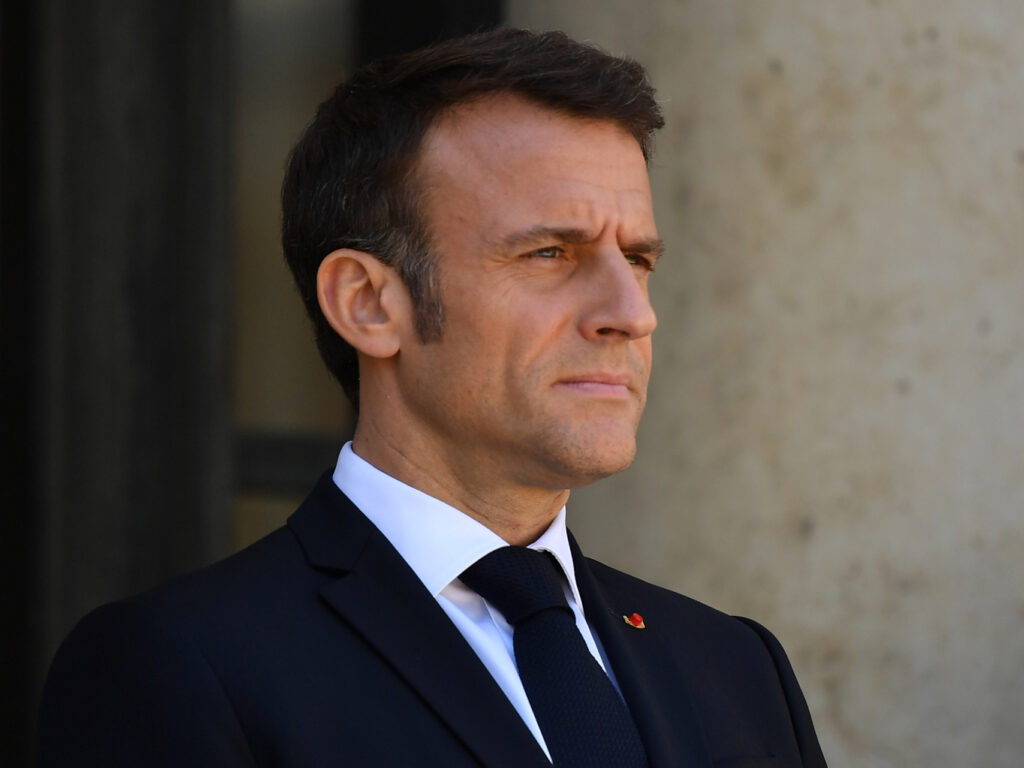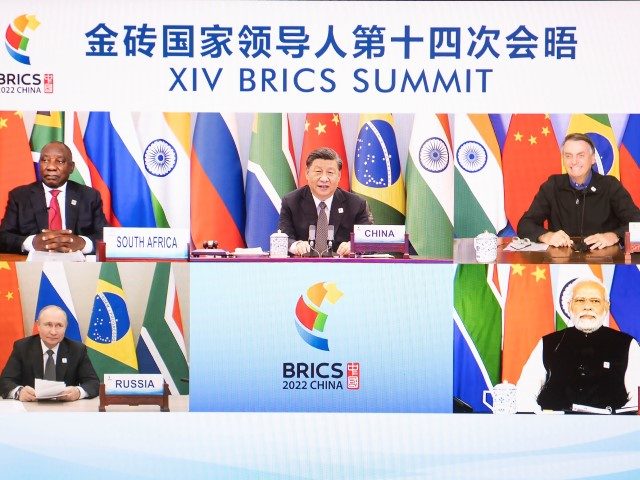Russian Deputy Foreign Minister Sergey Ryabkov said on Thursday that Moscow favors expanding the BRICS economic bloc to include more nations, but France will not be one of those new members.
French President Emmanuel Macron has asked to attend the upcoming BRICS summit in South Africa as a guest, but Ryabkov said that would be “inappropriate.”
“We are preparing for the BRICS Summit in close contact with the chairman, South Africa. New discussions are coming, including the important topic of BRICS expansion,” Ryabkov told a press conference on Thursday.
“The drum is beating ever more loudly on this issue. There are more and more applicant nations all the time. It is important for us to understand where we have a common denominator on this,” he said.

Russian Deputy Foreign Minister Sergei Ryabkov arrives to deliver a speech during a session of the UN Conference on Disarmament in Geneva on March 2, 2023. (Photo by FABRICE COFFRINI/AFP via Getty Images)
“We are working on the criteria for the admission of new members, and on the models for making appropriate decisions under the very creative, energetic leadership of the South African presidency, but we must understand that, ultimately, the expansion of BRICS is subject to a political decision,” Ryabkov added, by way of explaining why none of the applications have been processed yet.
The founding members of BRICS in 2001 were Brazil, Russia, India, and China. The name BRIC was coined by a Goldman Sachs economist named Jim O’Neill who predicted the four fast-growing economies would become dominant global powers within 50 years.
Skeptics noted that Goldman Sachs was pushing an investment fund for the four BRIC nations at the time and thus dismissed O’Neill’s prediction as marketing hype. The Goldman BRIC investment fund folded up in 2015, so they might have had a point.
The BRIC nations held their first formal summit meeting in Russia in 2009. South Africa was added as a fifth member, changing the acronym to BRICS, in 2010. The group launched its own financial institution, the New Development Bank, in 2014 as an alternative to the World Bank and International Monetary Fund (IMF).
The bloc has developed into something of an alternative to the European-American Group of Seven (G7). India often speaks of BRICS as a vehicle for developing its concept of the “Global South,” a loose alliance of developing nations who feel their perspective is not adequately represented by Western-focused organizations like the G7 or G20. China and Russia see BRICS as a way to rally political support against the United States and Europe.
As Ryabkov indicated, BRICS has been talking about expanding its membership for the past few years. In 2021, Egypt, Uruguay, Bangladesh, and the United Arab Emirates (UAE) bought shares in the New Development Bank, but they are not yet considered full members of the bloc, and their investments were much smaller than those made by the founding nations.
In 2022, Iran, Argentina, Saudi Arabia, Turkey, and Egypt petitioned to join BRICS. The alliance said some sort of application process was underway, but its details were vague. BRICS began allowing guests at its summit meetings, mostly representatives from potential new member nations.
Russian Foreign Minister Sergey Lavrov said in February 2023 that “more than a dozen” new members had submitted applications. By April 2023, the list of potential new members had grown to 19 countries, including 13 formal applications and six informal requests for membership. Recent formal applicants reportedly include Mexico and Nigeria.
Some observers theorize BRICS’ expansion has been discussed but not actually implemented because Russia’s invasion of Ukraine makes applicants nervous about getting too close to Moscow and triggering Western sanctions. Others suspect the existing members of BRICS love to talk about expansion but privately worry about diluting their own influence by bringing in too many new members.

French President Emmanuel Macron waits to receive the President of Lithuania, Gitanas Nauseda, at the Elysee Presidential Palace on May 24, 2023, in Paris, France. (Photo by Christian liewig Corbis/Corbis via Getty Images)
Last week, French President Emmanuel Macron made a surprising request to attend the BRICS summit in South Africa, which is currently scheduled for August. France is a G7 nation, and no such country has yet been invited to a BRICS meeting.
Russia’s initial response to Macron’s request was skeptical, even sarcastic, and on Thursday, Ryabkov confirmed that Moscow would refuse the French president.
“Clearly, leaders of states that pursue such a hostile and unacceptable policy towards us, discussing with such emphasis and conviction that Russia should be isolated on the international stage, and share the common NATO line on inflicting a so-called strategic defeat on us — such a leader is an inappropriate BRICS guest,” Ryabkov said, referring to France’s position on Russia attacking Ukraine.
“We are not hiding this approach of ours, we have told our colleagues from South Africa. We expect that our point of view will be fully accepted,” he said.
South Africa is already nervous about the possibility that Russian leader Vladimir Putin will attend the BRICS summit. As a signatory to the founding treaty of the International Criminal Court (ICC), South Africa would be obliged to arrest Putin for war crimes committed in Ukraine.
South Africa’s efforts to contrive an excuse for failing to arrest Putin have evidently not been well received by the ICC — leading to speculation that President Cyril Ramaphosa will plead with Putin not to attend the summit, or failing that, punt the event to last year’s BRICS president, China.
On Tuesday, French Foreign Minister Catherine Colonna said Macron is still hopeful about attending the BRICS summit as an observer. South African Foreign Minister Naledi Pandor said it would certainly be an “innovation to the model of BRICS participation that we’ve had up to this time” if Macron did indeed attend.

COMMENTS
Please let us know if you're having issues with commenting.